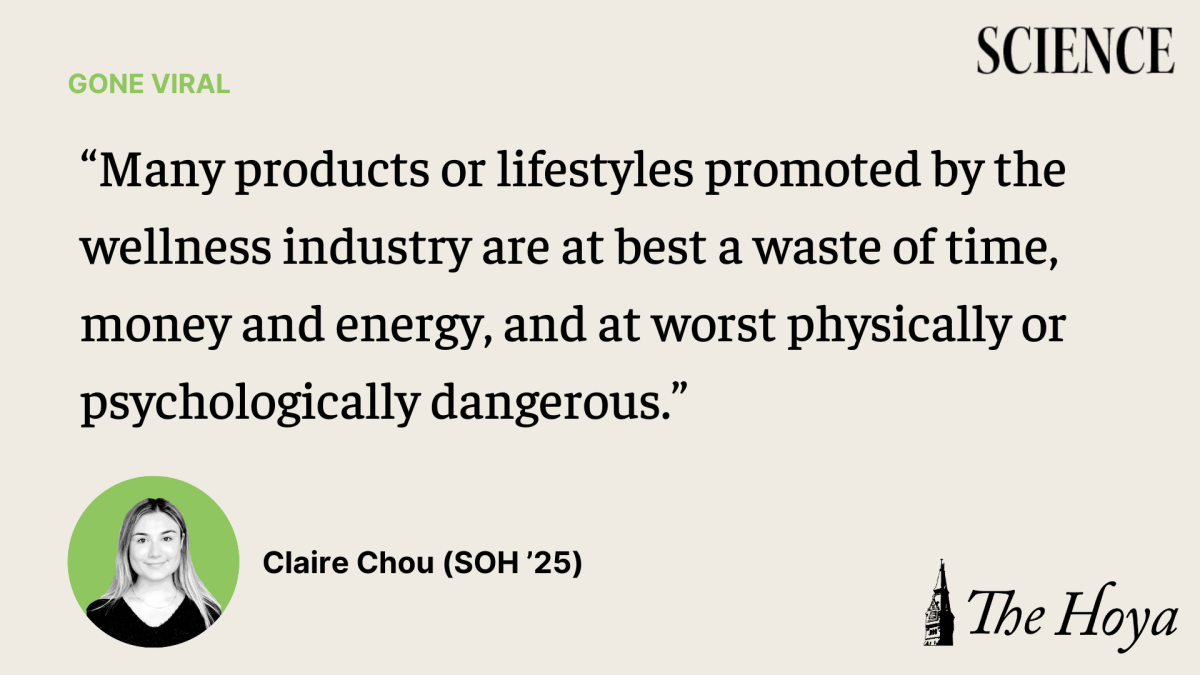The Global Wellness Institute, a non-profit organization dedicated to promoting preventative health and wellness education, defines wellness as the “active pursuit of activities, choices and lifestyles that lead to a state of holistic health.” The term “holistic” implies the pursuit of not only physical health, but also other layers, such as mental health or spiritual health. In a nutshell, wellness extends beyond only the absence of illness.
At first glance, the promotion of wellness sounds like a noble trend. Indeed, schools adopting student and employee wellness programs or businesses employing corporate wellness consultants may offer benefits. But with the global wellness market valued at more than $1.5 trillion, with an annual growth of 5% to 10%, it is crucial to recognize that wellness has been transformed from a benevolent idea into a profitable powerhouse of an industry that is only gaining more influence. Nowadays, I cannot open my phone without seeing an app that claims to help me lose weight, a serum that will clear my skin or a supplement that will make me sleep better. Furthermore, I also constantly hear friends, family members or peers rave about one of the above. And therein lies a paradox: In an industry that promises to alleviate sickness, consumers are being lured into the type of dynamic that author Christy Harrison called out in her book, “The Wellness Trap,” a fiery takedown of wellness culture. In an interview with The Cut, Harrison claimed that wellness culture is a trap that consumes people’s time, money, and actual well-being for the sake of profit.
The problem is that many of the claims made by influential figures in the wellness industry are unsubstantiated and can border on pseudoscience, or arguments that people mistakenly believe to be rooted in the scientific method. For example, Gwenyth Paltrow, actress and founder of wellness and lifestyle company Goop, has come under fire for sharing in a 2023 podcast interview that she eats bone broth for lunch most days, suggesting that eating bone broth for lunch has helped her cope with long-term effects of COVID-19. William Li, a Harvard-trained doctor, disputed this claim, explaining to USA Today that “it’s a nutrition-rich version of hot water. By no means is it a sound source of daily calories. Even for those looking to bone broth as a filling, low-calorie option to aid in weight loss, it still doesn’t replace full meals.”
Another factor exacerbating the wellness dilemma is that consumers today tend to value an influencer’s opinion, with about 10% to 15% of people making purchases that were recommended by an influencer. However, blindly adhering to the advice of a celebrity or media influencer isn’t new. In 1891, a German man named Louis Kuhne published “The New Science of Healing,” which details his experience overcoming pain and chronic illness during the Industrial Revolution. This time period catalyzed the wellness culture and industry, for people had more disposable income and were becoming more concerned about the physical and emotional toll of demanding labor.
In addition to valuing the opinion of influencers, consumers also prioritize aspects of wellness products such as personalization and digital format. Buzzwords like “clean” or “natural” are used to market not only products like skincare, but also supplements. However, enticements like personalization and catchy buzzwords can lead consumers to purchase products that have no measurable effect on their wellness. Capitalizing on American individualism, the wellness industry implies that you are solely responsible for your health and wellbeing, when, in reality, social determinants of health such as socioeconomic status, financial insecurity and discrimination play a larger role. The uncomfortable truth is that it is more profitable to make the healthy healthier than the sick healthy.
Currently, consumer preferences focus on wellness products that promise better fitness, better nutrition and better appearance. For women, wellness is often conflated with physical appearance, with influencers often implying that one has to look thin to be well. Feminist scholars have criticized this message, arguing aesthetic should not be synonymous with wellbeing. In a very “which came first, the chicken or the egg” fashion, women’s insecurities are both created and exploited by influencers, who almost by definition are paid to promote their lifestyle or specific products.
Many products or lifestyles promoted by the wellness industry are at best, a waste of time, money and energy and at worst, physically or psychologically dangerous. For example, there is no evidence that going gluten-free is healthier for anyone besides those who suffer from Celiac disease or those who are sensitive to gluten, yet gluten-free eating is a major diet trend. In general, many nutritionists caution against labeling certain foods or food groups as good or bad and instead argue that a more “intuitive” approach to eating is healthier for most people. When it comes to the allure of the wellness industry, I encourage consumers to look past superficial promises of self-improvement and investigate a company’s or influencer’s intentions and qualifications before subscribing to any behavioral change or investment.









